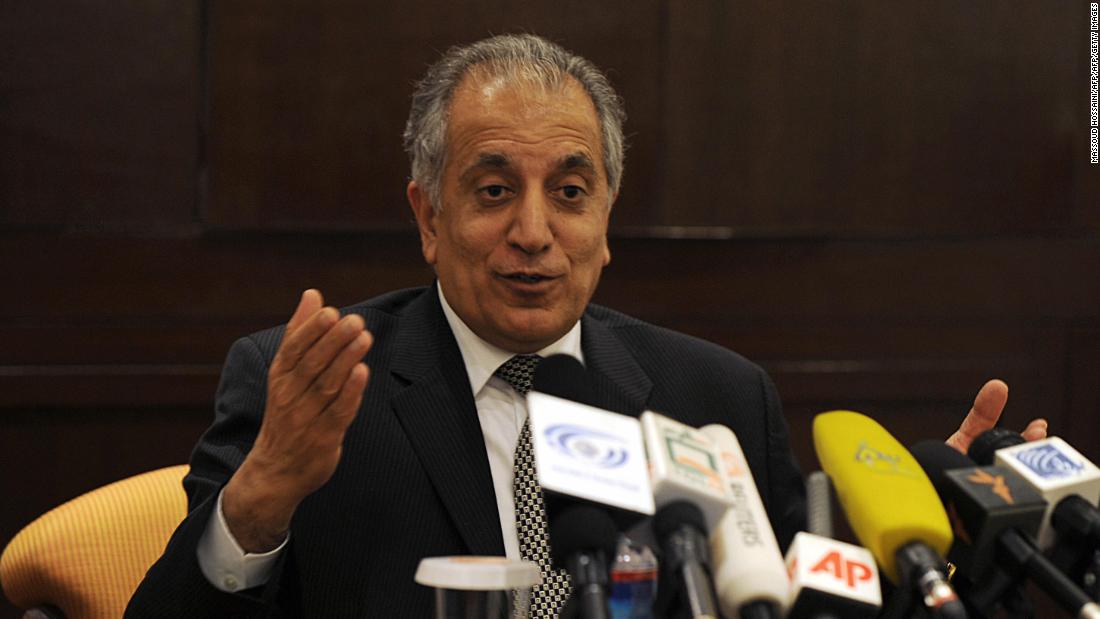[ad_1]
The agreement could lead to the gradual draw down of all of the almost 14,000 US troops in the country, fulfilling a longstanding goal and campaign pledge of the President’s, just as the most intense period of the 2020 election campaign gets underway.
“Yes, we have reached an agreement in principle,” Khalilzad said, according to TOLOnews. “Of course, it is not final until the US president (Donald Trump) agrees on it. So, at the moment, we are at that stage.”
News of the agreement comes as violence has spiked in Afghanistan, with the latest attack occurring just hours after Khalilzad’s interview. A car bomb targeted an Afghan police station in the capital Kabul on Monday, in an area close to the heavily fortified compound where many foreign embassies and international organizations are based,
At least five people were killed and 50 others wounded and taken to hospital, Interior Ministry spokesman Nasrat Rahimi told CNN.
On Monday, Khalilzad told TOLOnews the agreement with the Taliban is broken down into a main agreement with a second document addressing details related to different elements of the agreement.
Since taking up the envoy job a year ago, Khalilzad has held nine rounds of talks with the Taliban focused on four key issues: US forces’ withdrawal, counterterrorism assurances, a ceasefire and intra-Afghan negotiations.
Khalilzad told TOLOnews the US will not accept a return of the Taliban’s strict Islamic governing system, and said the Trump administration wants a government to be formed after the intra Afghan peace talks that would be agreed upon by all Afghans.
Even so, senior intelligence officials have repeatedly warned that the country remains fragile and, as it was when the Taliban gave refuge to Al Qaeda in the lead-up to the Sept. 11 attacks, could once again become a terrorist haven.
Khalilzad said the US withdrawal from the five bases depends in part on the security situation and a significant reduction in violence in those areas, but he added that he “can’t call it ceasefire, because it has been agreed that the word ceasefire belongs to the intra Afghan peace talks.”
Khalilzad’s talks with the Taliban have excluded the Afghan government, leading President Ashraf Ghani to express some skepticism about them. The Taliban had made clear they would only negotiate a cease-fire and a political settlement with the Afghan government and other Afghan political forces after US troop withdrawals were finalized.
‘Bringing it down’
On Monday, Khalilzad said the Afghan government had been consulted on all aspects of the talks, including the withdrawal of the US forces, counterterrorism assurances and a ceasefire.
The envoy added that Ghani and Afghanistan CEO Abdullah Abdullah had both read the agreement, but weren’t given copies. He said the agreement mandates that intra-Afghan talks start soon, adding that they will take place before Afghanistan’s presidential elections in Afghanistan on September 28.
The US preference is to have them take place in Norway, which is reportedly working actively to organize those negotiations.
Ghani’s spokesman, Sediq Seddiqi, said the Afghan president “has seen” the agreement and “key details” of the document were shared with him. The Afghan government will study the agreement and give Khalilzad its feedback, Sediq Sediqqi said.
In August, Trump told Fox News Radio that he is planning to withdraw thousands of US forces from the country, but will keep 8,600 troops there, at least for the time being. “We make a determination from there as to what happens … we’re bringing it down,” Trump said, repeating a claim that the US “could win that war so fast if I wanted to kill ten million people there … which I don’t.”
Trump said that the US would be reducing troops “very substantially,” and it was important to maintain a presence because Afghanistan is the “Harvard University of Terrorism.”
Trump has repeatedly been cautioned against a troop pullout by Republicans in Congress, including Sen. Lindsey Graham of South Carolina.
Gen. Joseph Dunford, chairman of the Joint Chiefs of Staff, also said any agreement with the Taliban must ensure that Afghanistan does not become a “sanctuary” for extremists. “I think it’s premature, I’m not using the ‘withdraw’ word right now,” Dunford told reporters at the Pentagon. “We’re going to make sure our, that Afghanistan’s not a sanctuary.”
CNN’s Masoud Popalzai in Kabul, and Ryan Browne, Michael Conte and Jamie Crawford in Washington contributed to this report
[ad_2]
Source link



